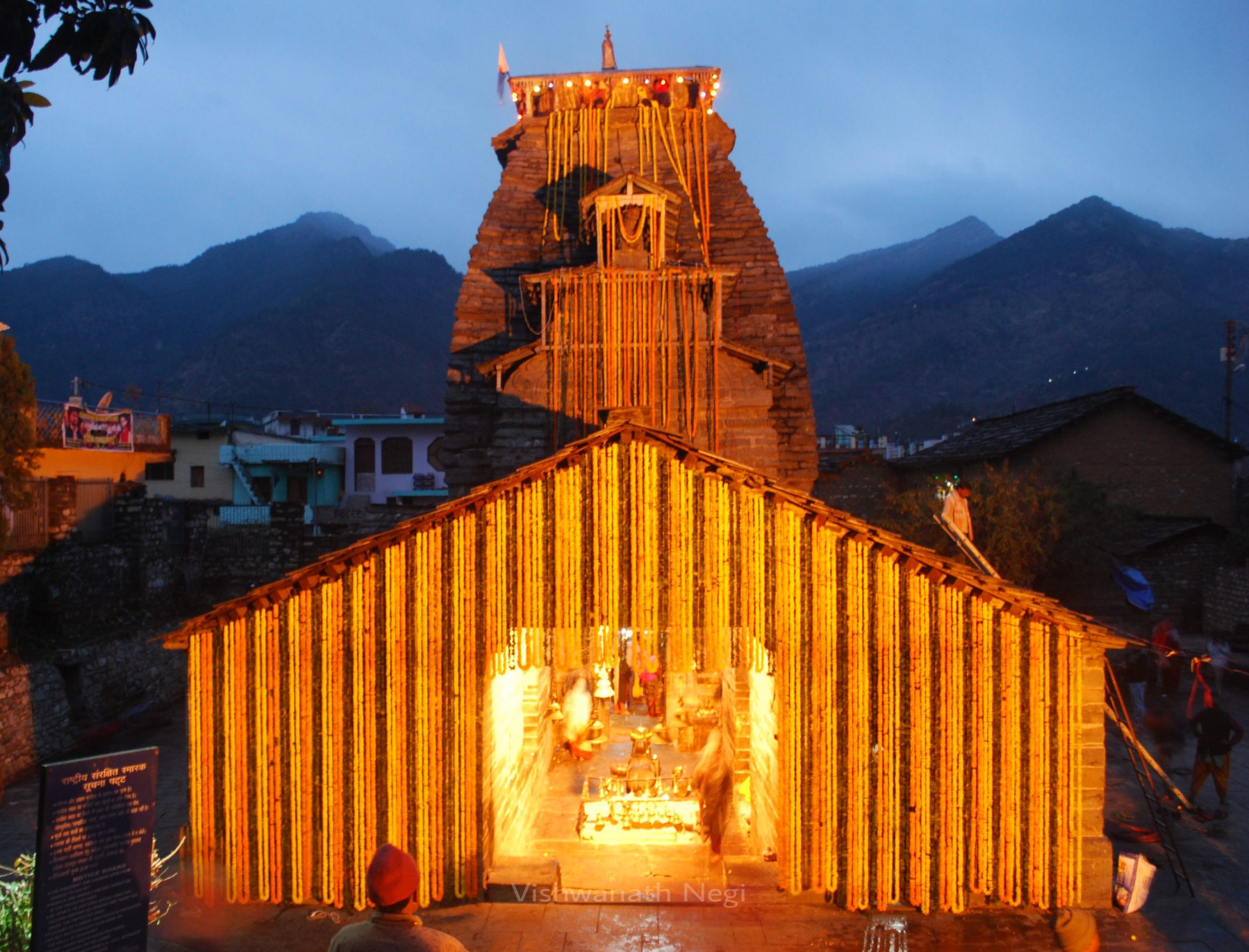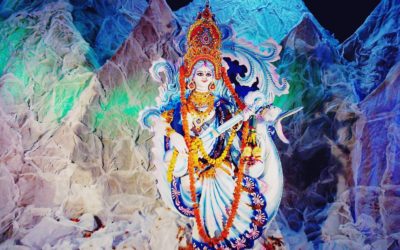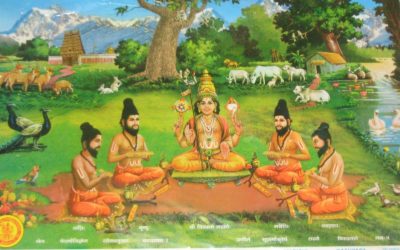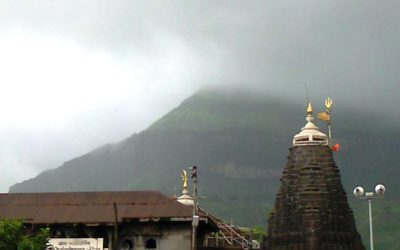Maha Shivaratri, the great night of Lord Shiva, is celebrated each year on the thirteenth day of the month of Maagha, (Phalguna,) with festivities continuing all through the night and into the next morning. On this sacred occasion, devotees celebrate Mahadeva by doing various forms of tapas (spiritual austerity) to deepen their connection with Him and raise themselves to a state of consciousness called Shiva Bodha, the bliss of being Shiva.
The tapas practiced on this night shouldn’t be confused with the penance of a guilty person trying to make amends for a past mistake, or someone inflicting self punishment; this is tapas to achieve something great. Fasting and night long meditations are both direct means by which we make ourselves one with the Adi Yogi.
Namah Shivaya
Likewise, another popular practice of the day, chanting the Panchakshari (five syllable) mantra “Namah Shivaya,” (meaning, “I surrender myself to Shiva,”) is not just paying lip service to the divine; it’s an act of surrender given to Shiva Himself. Sacred Sanskrit letters and their corresponding sounds are literally alive and infused with the energy that fulfill what we declare by their verbalization. Mahadeva revealed this great truth in the Shiva Sutras second book, seventh verse:
“Matrika Shakti is the power of sound that is the matrix of the cosmos, and manifests as the letters of the alphabet. Matrika is the subtle force behind thought and speech.” (Shiva Sutra, Chapter 2, Verse 11, Chetananda’s translation.)
Mahadeva calls each letter a Matrika, a little mother, and explains the shakti or power, we awaken by speaking these. Whatever we say aloud in Sanskrit manifests not just through the power of our intention, or the visualization we hold behind the words, but through the shakti of the words themselves. Mantra japa is not just mantra repetition; it’s not a practice to replace ordinary thoughts with spiritual thoughts, but a practice to awaken in us what the mantra declares. So on Shivaratri, if you spend the night chanting “Namah Shivaya” continuously, imagine the energy you’ll awaken!
Parvati Devi, who is deeply devoted to her cosmic beloved, called this auspicious day Maha Shivaratri after Mahadeva revealed to her that it is His favourite day of the year.
It was Devi who first performed the ideal abhishekam (ritual bath) to Shiva’s manifestation as the Linga, as is revealed in Kamika Agama. (“Shivaratri vrata was duly accomplished earlier by Devi…” Kamikagama, Volume 2, Chapter 11, Verse 3.)
On this day, Shiva entered into eternal union with Shakti, danced the cosmic Tandava as Nataraja, and became Neelakantha after swallowing the poison that was unleashed during the churning of the Milky Ocean. When we celebrate Shivaratri, we celebrate these great happenings, and tune ourselves to the glory of the Source of All, greatest among all Gods.
It is also Devi who first performed the worship Shiva declares as the best, in the Kamika Agama.
If you’re ready to experience the glory of Shiva, don’t miss celebrating Him on His favourite day; whether that means offering abhishekam to a linga, fasting during the day, meditating all night, continuously chanting Namah Shivaya, or anything else you’d like to do to forge that sacred connection. There is no other time to do it in, as powerful as Maha Shivaratri.
Rare living incarnation, Paramahamsa Nithyananda, throws a grand celebration on Maha Shivaratri every year. On the sacred occasion in 2014, Swamiji’s discourse was all about becoming a part of Shiva and joining His team.
Here is an excerpt from his talk on that occasion.
“I welcome you all with my love and respects.
Maha Shivaratri is the day Mahadeva assumed form from his formless space. Mahadeva existed eternally, he exists eternally, but on this day he entered into the space of form from formlessness. He created Brahma and Vishnu, empowered Brahma to create, Vishnu to maintain; he continued to remain in the formless space, but when there was a conflict between these two he had to resolve the conflict. So, to resolve the conflict, on this very day, Mahadeva assumed the form which can be perceived by Brahma and Vishnu.
Actually, you can’t worship Mahadeva! Worshiping Mahadeva is impossible! Please understand, he is beyond all the concept of time, space, form, formless, everything! He’s beyond! He is not an outlaw. Some people are trying to project him as an outlaw. He is beyond law, outlaw. He is the source of the laws, but can never be bound by any law. He is beyond the laws, understandings, principles. You can never worship him. You can only join his team by realizing him in you. Understand, you can only join his team. Based on the various levels of understanding, you can become a Shiva Gana, Shiva Bhoota. When Shiva Ganas, Shiva Bhootas celebrate the existence of Mahadeva, outsiders think Shiva Ganas and Shiva Bhootas are worshiping Mahadeva. Please understand, you can never worship Mahadeva; you can only join his team and celebrate his existence.
Only a devotee of Mahadeva can declare “Shivoham!” (“I am Shiva!”) There is no tradition where you declare “I am Narayana.” No! “Narayanoham” mantra does not exist! In the other religions, if you tell you are God, you will be killed. In other religions, you will be just killed if you say you are God. But in Shaiva Tradition, in Shaivism, your initiation starts with the great truth: “Shivoham.”
Only Mahadeva can celebrate making more and more Mahadevas! He doesn’t introduce you to you as a sinner or a slave or a follower. In Shaiva tradition, you are introduced to yourself as Mahadeva, Shiva. The best introduction you can get about you is from Shaiva tradition. Worship can be tolerated if it inspires you to evolve to the level of Shivoham. Only Vedic Tradition has the courage to declare even the concept of God is a stepping-stone for enlightenment. Shiva is also a stepping-stone for Shivoham.
Mahadeva is embodiment of Liberated Thinking. He does not want even himself to be an obstacle for you to achieve that ultimate liberation. That is why he starts with Shivoham.”
Reference:
- Original video – “Let’s Celebrate Shiva” on the YouTube channel called Nithyananda
- Shiva Sutra, Chapter 2, Verse 11, Chetananda’s translation
- Kamikagama, Volume 2, Chapter 11, Verse 3





0 Comments